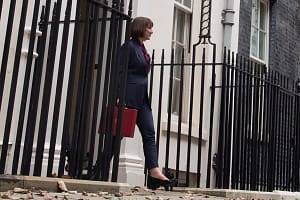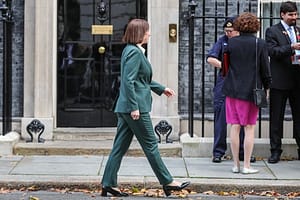Opinium’s latest poll reveals a mixed public response to Thursday’s Autumn Statement, with 31% approving of the measures announced, and 24% disapproving.
While three in ten (30%) think the measures will have a positive impact on the economy (27% think they will have a negative impact), a larger proportion believe they will have a negative effect on their personal finances (40%). Just 16% think the Autumn Statement will have a positive impact on their personal finances.
The public is more divided on whether the Statement will help close the deficit in government finances: 33% think it will help do that, 34% think it won’t.
Thursday’s announcements will not provide much relief to a substantial part of the UK public, with a quarter (25%) saying they are struggling with their current financial situation, while almost half (49%) say they are coping. Only 25% describe their situation as comfortable.
The majority (55%) think the government should be doing more to tackle the cost-of-living situation, while only 27% think they are doing all they reasonably can. Almost half (48%) do not believe the Government’s measures will reduce the cost of living, and 40% do not think it will help bring down inflation.
Bleak economic outlook
Overall, the public feels pessimistic about the economic outlook, with three-quarters (74%) expecting the state of the UK economy to get worse in the next 12 months, with only 8% thinking it will get better. Three in five (60%) also expect their own personal financial situation to get worse, while only 11% expect it to get better.
Many of the public also believe the UK economy is in a worse state than some of its neighbours, with 42% thinking it is worse off than Germany and 36% thinking the same about France.
In terms of which party is best to handle the economy, 31% would pick a Labour government led by Keir Starmer, whereas 30% would choose a Conservative government led by Rishi Sunak. However, a fifth (20%) would pick neither.
Voting intention
In the last two weeks, Labour’s lead has dropped by one point to 17 points, with 45% of the vote share compared to 28% for the Conservatives. The Liberal Democrats have 9% of the vote share, Reform UK has 6% and the Green Party has 4%.
Rishi Sunak has recovered some ground in approval ratings, with 33% approving (+4), while 31% disapprove (no change), giving him a net rating of +2 (up from -2 a fortnight ago). Meanwhile 35% (-1) approve of the job Keir Starmer is doing, and 31% disapprove (+3), resulting in a net rating of +4% (down from +8 a fortnight ago).
The public are split on who they think would make the best Prime Minister: 30% choosing Starmer, and 29% picking Sunak. 25% chose neither.
Following the Autumn Statement, Chancellor Jeremy Hunt has seen an improvement in his approval rating, with 27% now approving (+5) of the way he is handling his job, versus 30% disapproving (no change), giving him a net rating of -3 (up from -8% a fortnight ago).
Views on Autumn Statement policies
Extra NHS funding (76% good idea), cost of living payments (67%), retaining the triple lock (65%), changing the top rate of tax starting band (60%) and increasing the windfall tax on energy companies (60%) were all seen as good ideas. However, loosening the energy price cap is seen as a bad idea by 59% of the public. The change in the bankers’ bonus cap and the council tax change could be potential sore points (41% and 61% think these are bad ideas respectively).
| Policy | Good idea | Bad idea | Don’t know |
| The NHS budget will be increased by £3.3 billion per year for the next 2 years. | 76% | 9% | 14% |
| An additional cost of living payment of up to £900 will be given to households on benefits, including £300 for pensioner households | 67% | 15% | 17% |
| Keeping the ‘triple lock’ that raises state pension payments (by whichever is the highest out of average earnings, inflation or 2.5%) | 65% | 12% | 23% |
| Reduce the level at which the 45p top income tax rate starts from £150,000 to £125,140 | 60% | 17% | 22% |
| The levy on oil and gas companies will be raised from 25% to 35%, including a 45% levy on electricity generators | 60% | 16% | 24% |
| Electric-car owners, who have been exempt from vehicle excise duty, will have to pay the tax from 2025 | 58% | 23% | 19% |
| The tax-free allowance for dividend income and capital gains is to be reduced significantly in the next 3 years | 37% | 22% | 41% |
| The bankers bonus cap has been lifted to balance out the rise in corporation tax to 25% of profits | 23% | 41% | 35% |
| Councils can raise council tax by a maximum of 5% a year, rather than 4% as previously | 21% | 61% | 18% |
| From April 2023 the energy price cap will be loosened, with the cap on average costs raised from £2,500 to £3,000 per year | 18% | 59% | 23% |
Adam Drummond, Head of Political and Social Research at Opinium said, “Is it 2015 all over again? Labour is ahead by 17 points but below the headlines you can see how Rishi Sunak and Jeremy Hunt are trying to position the Conservatives to have any chance of winning the next election: ‘this is a crisis, the public finances are a mess and only the Tories will take the tough decisions to fix it’.
“Voters think Rishi Sunak is out of touch but that he is competent and somewhat decisive, Jeremy Hunt’s approval rating is better than you’d expect for a Chancellor when voters think the economy is circling the drain, and the Tories lead Labour on ‘bringing down the national debt’.
“However, unlike 2015, Labour leads on every other aspect of the economy and every other issue and Labour’s leader is seen as both competent and in touch with ordinary people. Just because re-running 2015 is the best strategy the Conservatives have doesn’t mean it’s a winning one.”






Leave a Comment